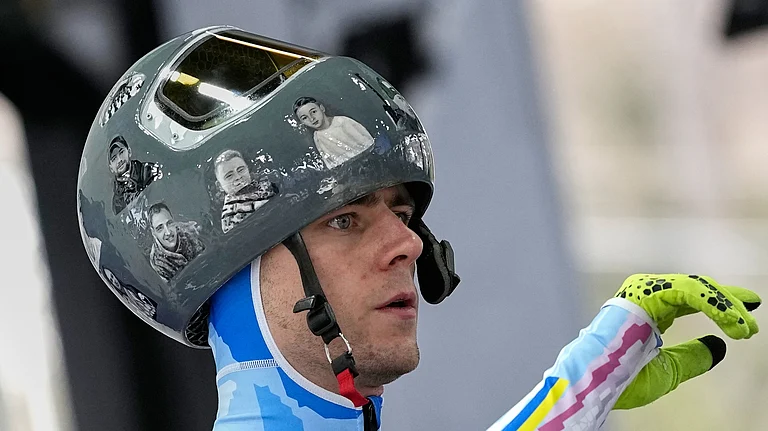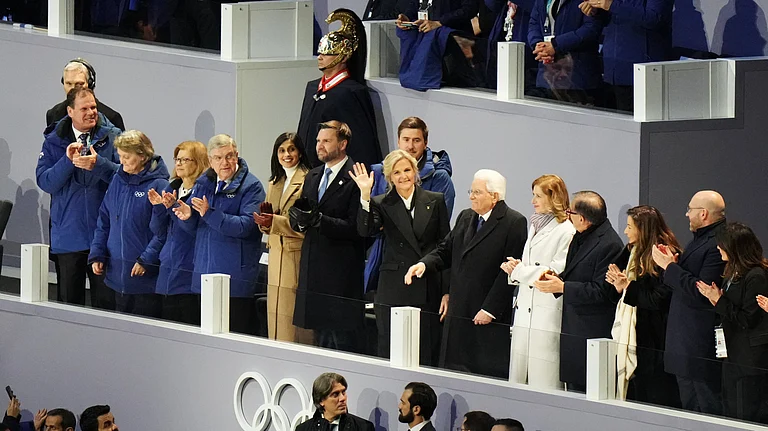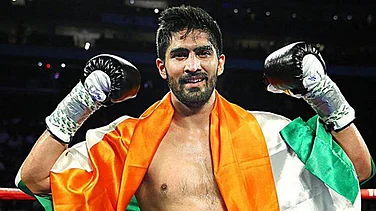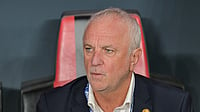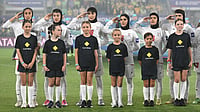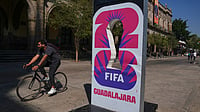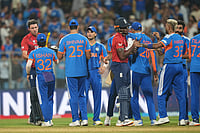Algerian boxer Imane Khelif has landed in the middle of a divide about gender in sports after her Italian competitor, Angela Carini, pulled out seconds into their bout at the Paris Olympics. (Medal Table | Schedule & Results | Full Coverage)
Outcry has come from conservatives like former US President Donald Trump and Italian Premier Giorgia Meloni. Khelif was disqualified from the 2023 world championships after failing unspecified and untransparent eligibility tests for women's competition from the now-banned International Boxing Association.
Khelif was assigned female at birth and it says so on her passport, which is the International Olympic Committee's threshold for eligibility for boxing because of the rift between the sport's governing body and the IOC.
Khelif is a formidable athlete with respected fighting skills, contending in top international events — including major amateur boxing tournaments over the past six years, such as the Tokyo Olympics. She's won a few regional gold medals.
But Khelif was decidedly not known as a dominant champion, an overpowering force or even a particularly hard puncher at her weight — not until this week in Paris.
Khelif defeated Carini in just 46 seconds Thursday, with the Italian boxer's tearful abandonment of the fight leading to innumerable portrayals of Khelif as an unstoppable punching machine whose presence threatens the health of her opponents.
The reality, to those who actually watch or participate in Olympic-style boxing, is quite different. Here's what to know about Khelif and the controversy:
Who is Imane Khelif?
Born in 1999, Khelif is from rural northwestern Algeria. Her father initially didn't approve of girls participating in boxing, but Khelif said she gave up soccer as a teenager to pursue her new passion, even though she had to travel 10 kilometers each way to the gym.
Khelif eventually caught the attention of Algeria's national team, making her major tournament debut in 2018 with a first-round loss at the AIBA — now the International Boxing Association — world championships. She lost five of her first six elite-level bouts, but improved and excelled.
Khelif was one of Algeria's first three Olympic women's boxers sent to Tokyo three years ago. She won her opening bout but lost her second to eventual gold medalist Kellie Harrington of Ireland.
She also raised her profile by doing well in the next two world championships, and she even became a UNICEF national ambassador early this year.
Why was Imane Khelif disqualified from the world championships?
Khelif reached the final of the 2023 world championships before she was abruptly disqualified by the IBA, which cited high levels of testosterone in her system. The circumstances of that disqualification have been considered highly unusual ever since it happened, and Khelif called it “a big conspiracy” at the time.
She had previously competed without issues and was disqualified by the sport's governing body only after she defeated Russian boxer Azalia Amineva in the 2023 tournament. The IBA is controlled by Umar Kremlev, who is Russian and brought in the state-owned energy supplier Gazprom as its primary sponsor and moved much of the governing body's operations to Russia.
This week, the IOC described it as "a sudden and arbitrary decision by the IBA" in which Khelif and Lin Yu-ting of Taiwan "were suddenly disqualified without any due process."
Lin was suspended for failing to meet unspecified eligibility requirements in a biochemical test.
The reasons for the two disqualifications are extremely murky, as is almost always the case with the IBA. The governing body has revealed little about the nature of the tests, including what was tested and who tested it. This lack of transparency would be unacceptable in major Olympic sports, and the IBA has been banned from the Olympics since 2019.
The IOC noted on Thursday that the boxing association's own documents say the decision was made unilaterally by the IBA's secretary general. Those documents also say the IBA went on to resolve at a meeting that it should “establish a clear procedure on gender testing” after it had already disqualified the two fighters.
Why is there outcry about Khelif competing?
Trump, Meloni and others like "Harry Potter" author JK Rowling have complained about Khelif being allowed to compete.
For the political far-right in Italy, which has been targeting issues such as LGBTQ+ rights, Khelif's participation was just the latest evidence of “woke” culture infecting sport. Meloni, who met Friday with IOC President Thomas Bach, warned "ideology" taken to extremes can discriminate and harm women's rights.
IOC spokesman Mark Adams told reporters on Friday that there has been "a lot of misinformation around on social media particularly, which is damaging."
Boxing in Paris is being run by a special IOC-appointed unit that the Olympic body says is applying rules, including eligibility decisions, that are based on the 2016 Games in Rio de Janeiro following the split with the sports governing body.
The IOC insisted this week that no scientific or political consensus exists on gender and fairness issues. It gave updated guidance to sports governing bodies in 2021.
Several sports bodies have updated their eligibility rules since the Tokyo Olympics were held in 2021, including World Aquatics, World Athletics and the International Cycling Union. They all decided to bar athletes from women's events who have transitioned from male to female and went through male puberty.
World Athletics also tightened rules last year to include testosterone testing for some athletes legally identified as female at birth though with a medical condition that leads to some male traits.



